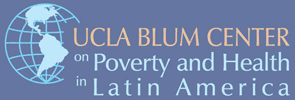Coursework
Global Health Minor
Migration and Health
Health Equity and Civil Rights Course
UCLA Global Health Minor, Michael A. Rodriguez, MD, MPH, Chair

The minor in Global Health allows students to develop an interdisciplinary understanding of health issues in a global context. Through a broad inventory of courses, the minor in Global Health provides a solid foundation in, and familiarity with, social determinants of health, epidemiology, environmental health, nutrition, data collection, and evaluation methods.
Students undertaking the Global Health Minor explore the institutional, economic, logistic, legal, social and artistic challenges facing global health solutions, investigate the health implications of globalization, as well as address issues of social justice and development, which are crucial to understanding the determinants of health issues around the world.
Through completing the Global Health Minor, students will be able to:
- Understand the fundamental issues that affect health equity and healthcare around the world;
- Use specific discipline-based methodologies (from engineering, political science, public health, etc.) to examine issues of health inequity and perceptions of health;
- Understand how cultural, social and environmental factors and issues of health equity influence the patterns of disease among people and populations, with emphasis on health in low-resource settings for local, regional or international contexts;
- Enhance their ability to be culturally sensitive, curious, understanding of other cultures and cross-culturally competent.
Migration and Health
With an estimated one billion international and internal migrants globally, a wide range of populations including workers, refugees, students, undocumented immigrants and others, experience a variety of health needs. As such, addressing the health of migrants is a crucial public health challenge faced by governments and societies both on the home front and to the new communities receiving the migrants.
This course is available Spring 2018 and is among the first courses in the ILTI University of California global health initiative to offer global health curriculum online throughout the UCs. The course, supported by the Innovative Learning Technology Initiative (ILTI) at UCLA, will provide an introduction to the history, status, and future of migration and health using the social determinants of health model to foster a multidisciplinary analysis of the status of migrant health around the world.
The online course was developed by Michael Rodriguez, MD, MPH (UCLA) and Nancy Burke, PhD (UC Merced), supported by Derek Slama (UCLA undergrad) and Ava Arndt (UCLA Instructional Designer) and the online sessions are presented by Dr. Rodriguez, along with faculty from across the UC system.
Lecture, three hours; discussion, one hour. Introduction to history, current status, and future of migration and health using social determinants of health model to foster multidisciplinary analysis of status of migrant health around world. Exploration of social determinants of health affecting migrating populations, including gender, race, ethnicity, socioeconomic status, poverty, religion, politics, governance, and environment. Letter grading.
Course Advisory Panel / Faculty
Michael A. Rodriguez, MD, MPH, professor and vice chair in the Department of Family Medicine at the UCLA David Geffen School of Medicine; founding director, UCLA Blum Center on Poverty and Health in Latin America
Nancy J. Burke, Ph.D., associate professor and Chair of Public Health in the School of Humanities, Social Sciences and the Arts at the UC Merced
Marc Schenker, MD, Department of Preventive Medicine, UC Davis
Roger Waldinger, Ph.D., Department of Sociology, UCLA
Steven Wallace, Ph.D., Fielding School of Public Health, UCLA
Course Objectives
Through completing the online Migration and Health course, student will be able to:
- Describe the historical context of migration and health, including the contributing economic, social and political factors
- Apply the social determinants of health model to critically analyze the status of migrant health around the world, with specific emphasis on the United States
- Discuss past and current responses to migrant health disparities through a multidisciplinary perspective
- Demonstrate research and technical writing skills through the development of a 10-15 page research paper
- Apply intervention strategies discussed in class to address a specific health disparity in migrant populations
Enroll via MyUCLA if you are a UCLA student or via Cross-Campus enrollment if present at another UC.
Health Equity and Civil Rights Course
The UCLA Blum Center, along with advocates and academics at The City Project, Charles Drew University of Medicine and Science, UCLA Medical School, and UCLA School of Public Health, have created a course on health equity, civil rights, and health impact assessments to prepare health professionals to work together. The course examines health disparities and how civil rights law and health impact assessments (HIAs) can help address them. The course features guest lecturers from the disciplines of law, public health, and medicine and student-led discussions with assistance and in partnership with faculty on relevant research.
Faculty
Charles R Drew University Professors: David Martins, MD, MSc; and Cynthia Gonzalez, PhD, MPH
UCLA Blum Center Director and Family Medicine Professor: Michael Rodriguez, MD, MPH
UCLA Public Health Professor: Brian Cole, DrPH, MPH
The City Project’s Founding Director and Counsel: Robert García, JD


